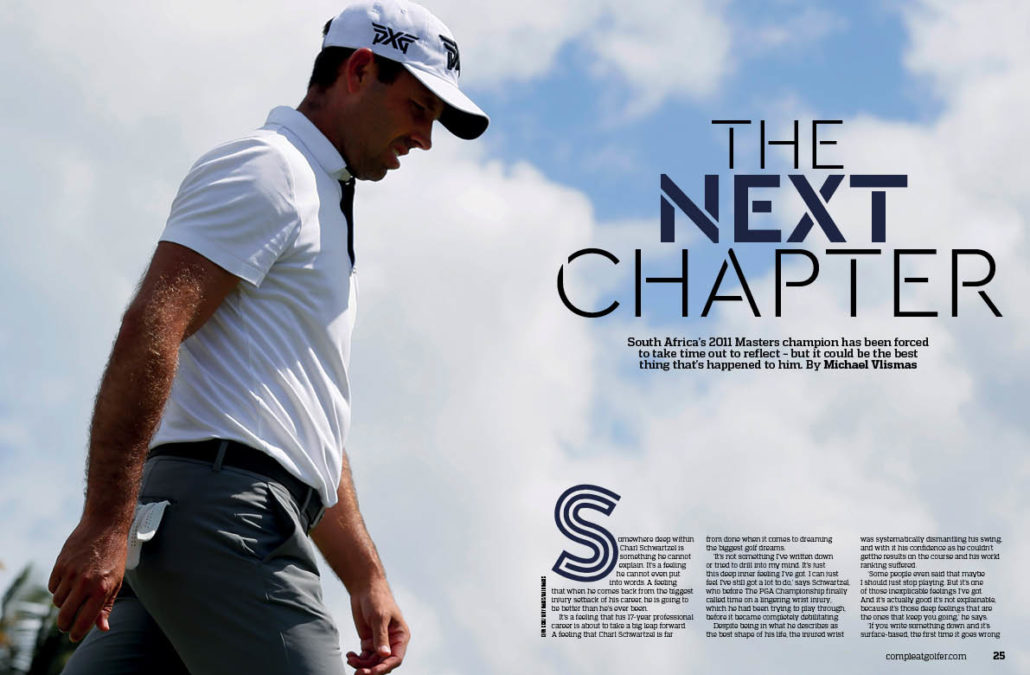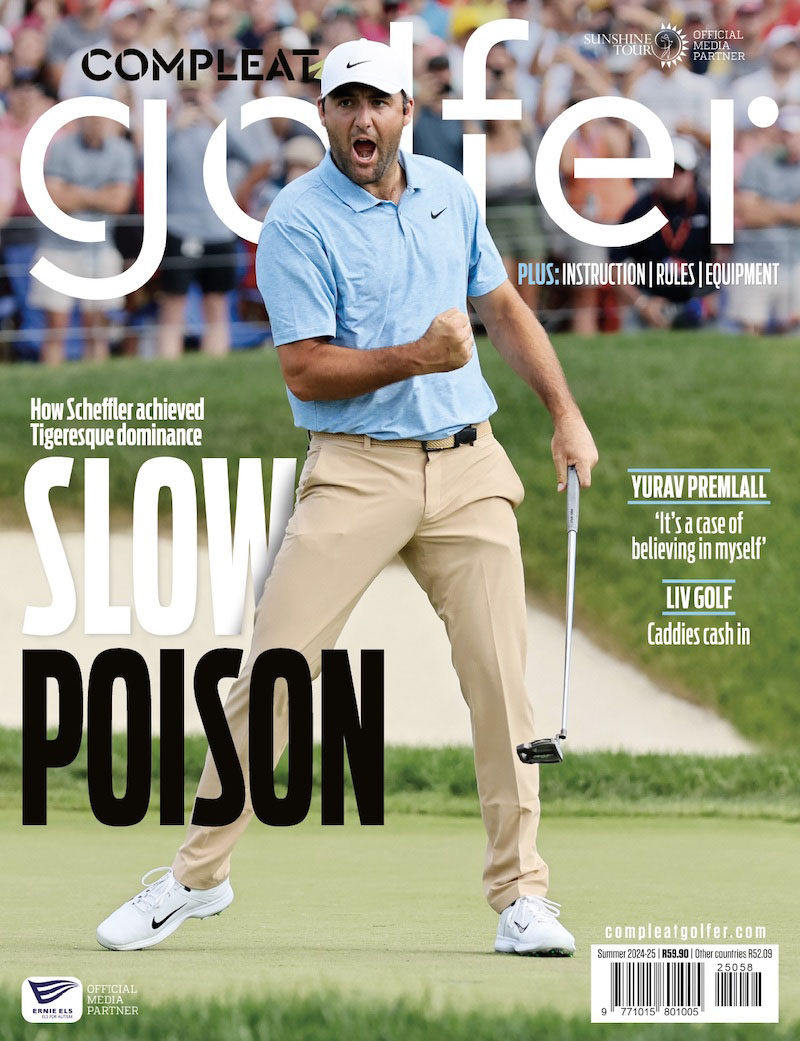South Africa’s 2011 Masters champion Charl Schwartzel has been forced to take time out to reflect – but it could be the best thing that’s happened to him, writes MICHAEL VLISMAS.
Somewhere deep within Schwartzel is something he cannot explain. It’s a feeling he cannot even put into words. A feeling that when he comes back from the biggest injury setback of his career, he is going to be better than he’s ever been.
It’s a feeling that his 17-year professional career is about to take a big leap forward. A feeling that Schwartzel is far from done when it comes to dreaming the biggest golf dreams.
‘It’s not something I’ve written down or tried to drill into my mind. It’s just this deep inner feeling I’ve got. I can just feel I’ve still got a lot to do,’ says Schwartzel, who before The PGA Championship finally called time on a lingering wrist injury, which he had been trying to play through, before it became completely debilitating.
Despite being in what he describes as the best shape of his life, the injured wrist was systematically dismantling his swing, and with it his confidence as he couldn’t getthe results on the course and his world ranking suffered.
‘Some people even said that maybe I should just stop playing. But it’s one of those inexplicable feelings I’ve got. And it’s actually good it’s not explainable, because it’s those deep feelings that are the ones that keep you going,’ he says.
‘If you write something down and it’s surface-based, the first time it goes wrong you leave it. But I’ve got this deep belief right down in me. I’ve got nothing to base it on at the moment and I don’t know where it’s coming from. I should be worried, but I’m not. I can’t explain it.’
He has now spent the longest time of his career away from golf, and he doesn’t know when he’ll return. But he knows it will only be when he is 100% confident that the tendinitis and minor arthritis in his wrist has healed.
The injury surfaced at the start of the year.
‘I was testing drivers and I hurt it then. Arthritis is normal. I think pretty much every golfer would have that. But the tendinitis was so bad that I couldn’t hold the club properly at the top of the backswing. I didn’t think much of it when it first happened, but it lingered. Every week I felt it and played through it.
‘I didn’t get off to a good start in the year so I played more and more tournaments, and the more I played the worse it got. Luckily I didn’t hurt any structural bones. It’s just a matter of resting it and getting it strong so it doesn’t happen again.’
After missing the cut at The Masters, Schwartzel partnered Louis Oosthuizen at the Zurich Classic. Thereafter he made the decision to step away from the game and give his wrist time to heal properly.
‘It’s frustrating. I had to miss all the Majors this year. You watch them on TV and it’s difficult not being out there. But it’s not like it was a willing decision on my part. The thing is, it takes time to identify the problem. You go through phases when you tell yourself to just play through it, but then it just gets too sore and you can’t do it. You are forced to take the time off.
‘We all want to keep playing. I’ve never pulled out of any tournament because of injuries. But it just got to a stage where it didn’t matter how hard I practised or worked, the injury was limiting me.
‘It was quite an easy decision eventually, but it takes time to get to that stage. That’s when you ask yourself why you didn’t slow down earlier. I could’ve maybe prevented this time off. I also don’t want to set a date for a comeback. I’m already out of it in terms of world ranking, so another month or two is not going to make such a big difference there, but it can make a big difference in the healing of the injury.
‘I’m really itching to play, but I want to make sure the injury doesn’t flare up again. It is what it is, and now I’m quite at ease with all of it. I’m actually looking forward to the comeback.’
In Schwartzel’s mind, he now has nothing to lose. And nothing to prove to anybody but himself.
‘I’m looking at this as a chance to start the second phase of my career. I’ve been a pro for 17 years so it’s time to re-evaluate things and make sure when I come back I have a great second half of my career. That’s what’s driving me to make a comeback. I have more to prove to myself.
‘I’ve learned there’s not much you can prove to other people. But there’s nothing like the satisfaction it gives me as a player to go through the ups and downs and come through them, and now maybe hit an up that’s higher than any I’ve had. That’s what I want to get to. I honestly feel that. I feel better than I have ever before. It’s just the hand. So mentally I feel like if my hand gets sorted out, there’s not much standing in my way. I’ve got nothing to lose.’
And Schwartzel points to some prominent examples in the game as inspiration for what he wants to achieve with this next phase of his career.
‘If I look at players like Henrik Stenson and Lee Westwood who fell down to 200 or 300 in the world and came back to become world No 1, I feel I also have a lot counting in my favour. I am physically in the best shape of my life notwithstanding my wrist, and I have 17 years of golf experience behind me. It’s now just about how I approach it all. I look forward to that challenge, to making a real big comeback similar to what those players did. I’ve got time on my side. I’m only turning 35 now; it’s not like I’m in my forties and trying to make a comeback. That’s why I feel when I do come back, I need to be pain-free. Then I think I can play even better golf than I’ve done to this point in my career.’
Schwartzel prefers to view the time he is spending away from the game as an opportunity for growth and to learn more about himself and the game. Those deeper thoughts and feelings don’t show themselves on the weekly treadmill of competitive golf and in the bubble that is the Tour. And now that he has stepped out of that, it has opened his mind.
‘I’ve found it interesting to watch the Majors on TV. When you’re playing you don’t really see much, but watching on TV you see how the guys are playing and competing, and I learned quite a bit. It made me realise how small the margins are.’
He was able to observe a powerful combination in Brooks Koepka that could become part of his own arsenal going forward.
‘Brooks has had an amazing run at the Majors. He’s got a good attitude. It’s almost like he doesn’t care. He obviously cares, but it’s getting to that stage where you can feel like you don’t care and you play more freely. So he’s making fewer mistakes than the rest of the field and he’s got a world of confidence. It’s quite a strong combination.’
And watching the WGC-FedEx St Jude Invitational he noticed what Rory McIlroy is struggling with.
‘Rory just looked a little out of sync. Especially when it came to the greens. Rory plays very freely when it comes to his long game. You can just see when he stands over a shot that it looks like he’s going to hit a good one. But when he stands over the putter, you’re not sure he’s going to make that four-footer. You almost hold your breath.’
He watched his fellow South Africans win too.
‘I watched Christiaan Bezuidenhout win at Valderrama. Erik van Rooyen is playing well, and Dylan Frittelli won on the PGA Tour. It just shows you how good a stepping stone the Sunshine Tour is. You can build a game on the Sunshine Tour that can sustain itself on any Tour in the world if you put your mind to it.’
Missing the cut at The Masters means he also watched that iconic moment in sports history, when Tiger Woods secured his 15th Major win. And he’s taken something from that too.
‘It was one of those moments that will be spoken about forever. You know how far down and out Tiger was, because you go through those moments yourself. Imagine what Tiger, lying in bed at night during his lowest moments, was thinking; that he was never going to be able to play again. That’s not a great feeling. In my case, I’m not lying there thinking I’m never going to play again. I’m thinking about how good I’m going to be when I come back.
‘He had phases when he didn’t even know if he could walk 18 holes again. Imagine what’s going through his head, and then turning it around like he has. He was building himself from the absolute bottom to winning a Major again. That’s one hell of an achievement.
‘You know, this is by far the longest time I’ve spent away from the game. The other times you willingly take some time off, but you’ll still play and practise somewhere in between and you don’t really lose touch with the game. But now I haven’t swung a club since I played with Louis at the Zurich Classic. I know I’m going to need a lot of hours of practice to get myself back on a level, and that requires a lot of repetition so my hand needs to be quite strong for me to just do that.
‘I have to be healthy. I have to be able to move the club and my body in a way that I can hit the golf ball to a consistent level. You’re not going to win hitting the ball all over the show. You can scramble, but you can only afford one or so of those rounds. You need consistency in movement and your thinking. That allows you to look down at your target and hit it hard. When your body allows you to do it, your mind is going to start believing you can do it all the time, and that’s when you start rolling with confidence.’
Deep thinking. Deep feelings. And a deep purpose for Schwartzel.
The comeback might turn out to be just the start.








